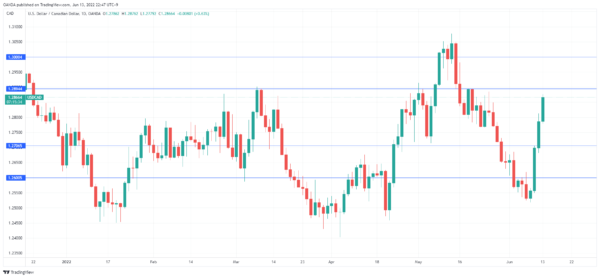The Canadian dollar continues to lose ground, despite solid Canadian employment data on Friday. In the European session, USD/CAD is trading at 1.2845, up 0.47% on the day.
US dollar climbs after CPI rises
The US dollar posted strong gains on Friday, as US inflation continued to climb in May. Headline inflation rose to 8.6% YoY, up from 8.30% in April. Core inflation dipped to 6.0%, down from 6.2%, but that didn’t soothe investors, who were looking for an even stronger decline. The inflation data left the markets with a sour taste of entrenched inflation, which sent equities down and the US dollar higher.
The Fed will not be pleased with the latest inflation report, and it’s clear that it will have to keep its foot on the gas when setting interest rates. That could mean that we’ll see 50-bp hikes in June, July and September. Just a couple of weeks ago the Fed signalled it would take a break in September, but that now seems a luxury it can’t afford, given that inflation hasn’t eased.
There have been calls for the Fed to deliver a massive 75-bps salvo at Wednesday’s meeting, but such a shock move seems unlikely, especially in the current turbulent economic environment. If Fed Chair Powell is looking to send a hawkish message to the markets, he could hint at the meeting press conference that a 75-bp increase is on the table if inflation doesn’t ease. Such a warning would likely boost the US dollar.
Canadian job data ended the week on a strong note, as the economy created 39.8 thousand jobs in May, up from 15.3 thousand in April (30.0 thousand exp.). The unemployment rate ticked lower to 5.1%, down from 5.2% (5.2% exp.). Ordinarily, these numbers would have boosted the Canadian dollar, but they were overshadowed by US inflation, which dampened risk appetite and sent the Canadian dollar lower.
USD/CAD Technical
- USD/CAD faces resistance at 1.2894. Above, there is resistance at the round number of 1.3000
- There is support at 1.2706 and 1.2600

